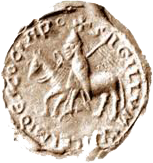Fair Rosabelle of Roslin
from The Lay of the Last Minstrel,
a poem by Walter Scott, Esq.
London, 1805, pp. 187–192.
…
Rose Harold, bard of brave St Clair;
St Clair, who, feasting high at Home,
Had with that lord to battle come.
Harold was born where restless seas
Howl round the storm-swept Orcades;
Where erst St Clairs held princely sway,
O’er isle and islet, strait and bay;
Still nods their palace to its fall,
Thy pride and sorrow, fair Kirkwall!––
Thence of the marked fierce Pentland rave,
As if grim Odinn rode her wave;
And watched, the whilst, with visage pale,
And throbbing heart, the struggling sail;
For all of wonderful and wild
Had rapture for the lonely child.
XXII.
And much of wild and wonderful,
In these rude isles, mighty Fancy cull;
For thither came, in times afar,
Stern Lochlin’s sons of roving war,
The Norsemen, trained to spoil and blood,
Skilled to prepare the raven’s food;
Kings of the main their leaders brave,
Their barks the dragons of the wave.
And there, in many a stormy vale,
The Scald had told his wondrous tale;
And many a Runic column high
Had witnessed grim idolatry.
And thus had Harold, in his youth,
Learned many a Saga’s rhime uncouth,
Of that Sea-Snake, tremendous curled,
Whose monstrous circle girds the world;
Of those dread Maids, whose hideous yell
Maddens the battle’s bloody swell;
Of chiefs, who, guided through the gloom
By the pale death-lights of the tomb,
Ransacked the graves of warriors old,
Their faulchions wrenched from corpses’ hold,
Waked the deaf tomb with war’s alarms.
And bade the dead arise to arms!
With war and wonder all on flame,
To Roslin’s bowers young Harold came,
Where, by sweet glen and greenwood tree,
He learned a milder minstrelsy;
Yet something of the Northern spell
Mixed with the softer numbers well.
XXIII.
HAROLD
